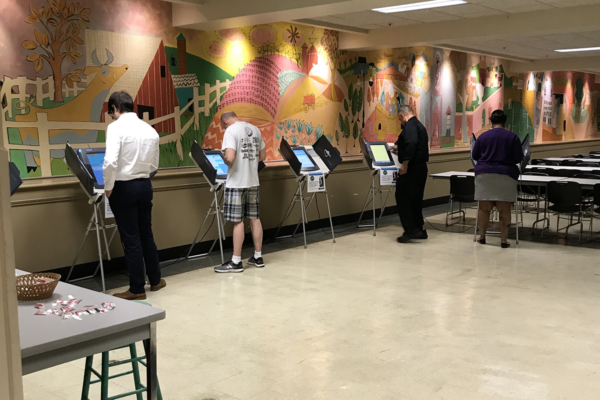Church invites Episcopalians to join 2024 Election Activators cohort, encourage voter engagementPosted Feb 13, 2024 |
|

Voters fill out ballots at Emmanuel Episcopal Church in Boston, Massachusetts, on Nov. 8, 2022. Photo: Egan Millard/Episcopal News Service
[Episcopal News Service] Kim Hayes was part of the inaugural 2022 cohort of Episcopal Election Activators, a program launched by The Episcopal Church’s Office of Government Relations to encourage voter engagement during that year’s elections. Hayes, now 71, renewed her commitment to the program again for 2024 because she still feels a “sense of urgency” in this work, especially in a presidential election year.
“It’s just really important for people to get out and vote and take responsibility for [electing] who is representing us,” Hayes, a member of the Diocese of Western North Carolina who lives near Asheville, told Episcopal News Service.
She is one of 55 Episcopalians signed up so far with Episcopal Election Activators, and the Washington, D.C.-based Office of Government Relations is encouraging more to participate. As Election Activators, they receive training in voter registration and other engagement strategies while benefiting from the support of their peers in the network and the office’s staff.
The Episcopal Church does not endorse individual political candidates but rather encourages nonpartisan advocacy and political engagement by Episcopalians as a way of witnessing to Jesus’ gospel message in today’s world. The Office of Government Relations, following public policy positions endorsed by General Convention, regularly meets with federal officeholders to discuss the church’s stances on the issues of the day. It also promotes churchwide engagement through its Episcopal Public Policy Network.
It launched Election Activators two years ago as another way to motivate Episcopalians to participate in the democratic process. Alan Yarborough, the office’s church relations officer, said cohort members like Hayes are already active in encouraging people to vote in their communities.
“It’s critical that Episcopalians not only vote but understand the important role our churches can play in supporting free and fair elections and a peaceful transfer of power,” Yarborough said in a written statement to ENS. He invited more Episcopalians to sign up online “if you are at all interested in this work, or even already doing election engagement now.”
Emily Hopkins, of the Diocese of California, is another returning member of Episcopal Activators. At age 69, Hopkins, a retired Navy captain, also is active in the League of Women Voters and regularly serves as a poll worker on Election Day.
“I do what I can in a nonpartisan way to strengthen our democracy,” Hopkins told ENS. Much of her work centers on registering people to vote – in elections from U.S. president on down to local offices and ballot measures.
Hopkins lives east of Oakland in Walnut Creek. This year, she plans to spend some of her time with a local social service agency that provides day services for people who are homeless, helping them register to vote if they choose. In 2022, she partnered with St. Anna’s Episcopal Church in Antioch, inviting parents to register to vote when they came to the church to receive the school uniforms the congregation was giving to families.
“As Episcopalians, I think we’re supposed to be the hands and feet in our community and our daily lives, so this is a way we can make a difference,” Hopkins said. “It empowers people.”

Voters in October 2022 take advantage of early-voting stations set up in the “mural room” at Calvary Episcopal Church in Memphis, Tennessee. Photo: Lauren Reisman
The Episcopal Election Activators program builds on the Office of Government Relations’ growing collection of online resources available to Episcopalians and others interested in election engagement. Its “Vote Faithfully” toolkit specifically highlights a resolution passed by General Convention in 2012 that notes, “the United States has been a vigorous human rights advocate for many years, opposing arbitrary restrictions on the right to vote and insisting on fairly conducted elections for legislative representatives.”
Recent General Convention resolutions have opposed voter suppression efforts and promoted expansion of voter eligibility, as outlined in this resolution passed in July 2022. Another resolution from that year backed changes to the Electoral Count Act of 1887 intended to prevent threats to democracy like the mob that attacked the U.S. Capitol on Jan. 6, 2021, seeking to block the certification of Joe Biden’s election as president.
Like Hopkins, Hayes, a retired marketing professional, emphasized that the church’s engagement is nonpartisan. At the same time, “our church makes some strong statements about justice and things of that nature,” Hayes said, including the issues relevant to voters when they go to the polls.
Hayes senses that one of the biggest challenges in 2024 is combatting the “lethargy” she has noticed among voters, who may be frustrated with politics and elected officials’ inability to get their work done.
“I worry that there will be more people who stay home and just don’t vote at all, which just would be a tragedy,” she said.
This year, she and other Election Activators will be working in their congregations and communities to counteract that lethargy, reminding people of the importance of making their voices heard through their votes.
– David Paulsen is a senior reporter and editor for Episcopal News Service. He can be reached at dpaulsen@episcopalchurch.org.

Social Menu